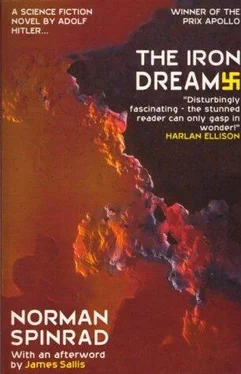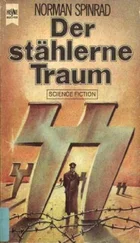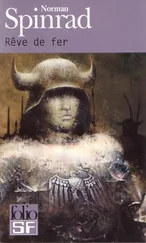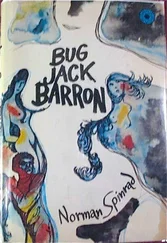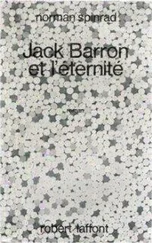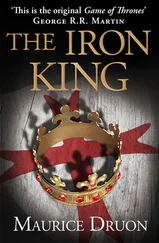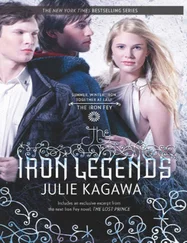Norman Spinrad - The Iron Dream
Здесь есть возможность читать онлайн «Norman Spinrad - The Iron Dream» весь текст электронной книги совершенно бесплатно (целиком полную версию без сокращений). В некоторых случаях можно слушать аудио, скачать через торрент в формате fb2 и присутствует краткое содержание. Год выпуска: 1999, ISBN: 1999, Издательство: Toxic, Жанр: Фантастика и фэнтези, на английском языке. Описание произведения, (предисловие) а так же отзывы посетителей доступны на портале библиотеки ЛибКат.
- Название:The Iron Dream
- Автор:
- Издательство:Toxic
- Жанр:
- Год:1999
- ISBN:1-902002-16-4
- Рейтинг книги:4 / 5. Голосов: 1
-
Избранное:Добавить в избранное
- Отзывы:
-
Ваша оценка:
- 80
- 1
- 2
- 3
- 4
- 5
The Iron Dream: краткое содержание, описание и аннотация
Предлагаем к чтению аннотацию, описание, краткое содержание или предисловие (зависит от того, что написал сам автор книги «The Iron Dream»). Если вы не нашли необходимую информацию о книге — напишите в комментариях, мы постараемся отыскать её.
Lord of the Swastika
The Iron Dream — читать онлайн бесплатно полную книгу (весь текст) целиком
Ниже представлен текст книги, разбитый по страницам. Система сохранения места последней прочитанной страницы, позволяет с удобством читать онлайн бесплатно книгу «The Iron Dream», без необходимости каждый раз заново искать на чём Вы остановились. Поставьте закладку, и сможете в любой момент перейти на страницу, на которой закончили чтение.
Интервал:
Закладка:
A dozen Knights of the Swastika, still attired in their barbaric splendor, stood guard at strategic points around the room while Bogel, Stopa, and six more ex-Avengers met the roadsteamer in the courtyard. Feric himself had donned a brown hunter’s tunic of exaggerated austerity which was sure to stand out from whatever the others might wear due to its utter lack of adornment.
All in all, it seemed to Feric that he had prepared a proper welcome.
As he had ordered, Stopa knocked loudly on the heavy wooden door, formally requesting entrance. Feric gave the order, and one of the Knights flanking the door opened it with a somewhat ragged flourish, albeit more or less in the spirit which he had been taught. Bogel and Stopa led in an altogether motley crew of middle-aged, somewhat pallid, and not a little threadbare creatures, a half dozen of them in all. The best that could be said of these nabobs of the Human Renaissance Party was that they were clearly examples of the pure human genotype and projected a certain aura of dogged if forlorn determination. Beside Stopa and the six sturdy, high-spirited ex-Avengers who brought up the rear of the group, the Party leadership cut a sony spectacle. As the men approached him, Feric felt a fleeting pang of annoyance at the caliber of the material he was expected to lead.
But his mood immediately brightened when Stopa, with perhaps too much of a comradely grin on his face, came to a halt at the foot of the table with a nice snapping of his bootheels together, shot out his arm in the ancient royal salute, and bellowed: “Hail Jaggar!” Instantly, the ex-Avengers all brought their bootheels together, saluted with suitable vigor, and echoed the salutation eighteenfold. What they presently lacked in precision and dash they made up for in enthusiasm.
For a moment, the Party leaders looked round, apparently unsure of what was expected of them. Then Bogel saluted, and shouted “Hail Jaggar” in a clear voice of utter sincerity. Somewhat uncertainly and with absolute lack of spirit, the gaggle of clerklike men raggedly aped the salute and managed to utter the salutation. At this point, it was as much as could be expected.
Bogel made the introduction admirably short and simple: “Truemen, our new leader, Feric Jaggar.”
“Greetings,” Feric said. “You’ve just given the new Party salute, if none too smartly. No doubt you will soon develop the proper spirit. But we have more concrete matters to deal with today. Please be seated.”
Bogel and Stopa took up seats at Feric’s left and right hands respectively; the Party officials seated themselves below them, stealing glances at the Great Truncheon, wondering, no doubt, at the truth of Bogel’s contention that the new leader he had found was capable of wielding it. In due course their doubts would be annihilated; for the present, Feric preferred the frankness of skepticism.
Bogel went through the motions of introducing the men formally, though of course Feric had been briefed on their histories and pedigrees long since. Otrig Haulman, a prosperous tavemkeeper, was the Party treasurer, somewhat devious, but totally dedicated to genetic purity, having proven his loyalty to the cause by backing it with his own coin. Tavus Marker, a commercial sloganeer, was the corresponding secretary, a thin, unhealthy-looking man, but a tireless worker nevertheless. Heermark Bluth and Barm Decker were a butcher and a minor police official respectively; they, along with Bogel, were the Party’s chief orators. Manreed Parmerob, a teacher of history, was the present Party theoretician. Sigmark Dugel was chairman of the membership committee—a dubious distinction considering that the Party presently had no more than three hundred members. As a retired brigadier who maintained personal contacts in high military circles, Dugel would no doubt one day prove more useful. All in all, not exactly what one would call an elite group, but not entirely without potentialities.
Moreover, the presence of Stopa and the sturdy lads he commanded lent the proceedings a certain air of solidity that they might have otherwise lacked. Here were men clearly capable of acting forcefully and with telling effect if need be, and obviously imbued with a sense of personal loyalty to Feric. Already he had brought a new dimension of practicality and martial spirit to this somewhat dreamy-eyed Party; their joining in the new Party salute and salutation had been acknowledgment enough of that fact.
“We have a great deal to accomplish quickly. Truemen,” Feric began crisply. “I’ve been studying the Human Renaissance Party as it now stands, and there will have to be some drastic changes. To begin with, the name itself will have to go. In the mind of plain folk, it suggests some sort of tavern debating society, not a rigorous and resolute band of patriots. Something like ‘The Sons of the Swastika’ would be much more to the point. Since the Time of Fire, the swastika has been the unequivocal symbol of racial purity. As such it epitomizes our cause in a manner that even the simplest bumpkin can readily understand. Moreover, it will give us certain advantages in the area of practical propaganda, which will become apparent later.”
“A stroke of genius!” Marker exclaimed. “Our cause and our Party name can both be expressed in a single visual symbol that will be readily understood even by illiterates. No other party will have such a powerful weapon in the fight for the public’s attention.”
Feric was impressed by the way Marker had understood the essence of his master stroke exactly and by the way it had envigored his countenance with fire and spirit. To discover this quality in a subordinate at this early stage was most promising.
The others, for their part, mumbled among each other diffidently, with the exception of the theorist Parmerob, who seemed considerably agitated. Finally, his annoyance burst into speech.
“The name Human Renaissance Party was chosen after considerable deliberation,” he said petulantly. “It accurately represents the basic Party positions.”
“Accuracy is not the same thing as force,” Feric pointed out. “The name of the Party must shout what we stand for with the voice of a sergeant-major.”
Parmerob grew even more indignant. “I formulated the name and the Party platform myself,” he declared. “We stand for the purity of the true human genotype, the rigorous enforcement of the genetic purity laws, the complete annihilation of the anti-human Dominators, the exclusion of all mutants for all time from the sacred soil of Heldon, and the extension of Helder dominion over new areas and the purification of their gene pools wherever possible. This is the formula for a renaissance of true humanity—thus the name Human Renaissance Party.”
Feric rose slowly and placed his right hand casually on the handle of the Great Truncheon of Held; all eyes were instantly upon him. Would they now actually witness the wielding of the Steel Commander? There was a moment of silence in which only the whispered roar of the bonfire in the great stone fireplace could be heard.
Feric’s voice broke this stillness: “Is there any nuance of what you have said not implicit in the symbol of the swastika?”
Abruptly, Parmerob’s face creased in a smile. “You are right of course,” he said. “Your name for the Party is infinitely superior to mine. Sons of the Swastika we are indeed.”
Feric reseated himself without hefting the Great Truncheon, though he kept his hand upon it. “Very well,” he said, “that’s decided. I’ve designed a Party flag, armband, and various emblems around the swastika motif.
I’ve also designed a uniform for the Knights of the Swastika, our storm-troop arm. The men you see here are the nucleus of that force; presently the Knights of the Swastika number two score, but I have plans for a troop of at least five thousand.”
Читать дальшеИнтервал:
Закладка:
Похожие книги на «The Iron Dream»
Представляем Вашему вниманию похожие книги на «The Iron Dream» списком для выбора. Мы отобрали схожую по названию и смыслу литературу в надежде предоставить читателям больше вариантов отыскать новые, интересные, ещё непрочитанные произведения.
Обсуждение, отзывы о книге «The Iron Dream» и просто собственные мнения читателей. Оставьте ваши комментарии, напишите, что Вы думаете о произведении, его смысле или главных героях. Укажите что конкретно понравилось, а что нет, и почему Вы так считаете.
